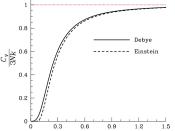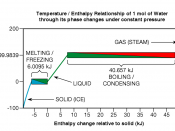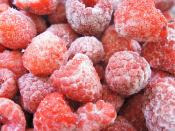Investigating the factors which effect the heating up of a liquid
Introduction
In this experiment I am going to see the difference in the temperature of water that is being heated as time increases.
Circuit Diagram
Factors
There are several different variables that I could have chosen to investigate. These include changing the voltage, the volume of the liquid, the liquid, time and the current. Voltage is the measure of energy available to drive a current around a circuit and changing it would change the potential difference of the experiment. Changing the volume of the liquid would mean that there was more particles that need to gain kinetic energy therefore the liquid would take longer to heat up. Different liquids have different specific heat capacities and so if we varied the liquid then we would find that liquids with higher specific heat capacities would take longer to heat up. If I increase the current then that will mean that there are more 'charge carriers' flowing around the circuit and so the liquid will heat up faster.
Varying the time would mean meaning the liquid to heat up for different times and measuring the temperature at given intervals.
I have chosen to vary the temperature because I think that it will give me the most reliable results.
Theory
Specific heat capacity is the energy, which is required to raise 1g of a substance by 1 âêC. For water this energy is 4.17 J/K/g or 4170 J/K/kg.
I am also going to work out how much energy there is after each minute of time. This can be calculated using the equation
Energy = VIT (Energy = voltage x current x time). Particles in a liquid contain kinetic energy and so they must have an average kinetic energy. Therefore -
Energy is put...


